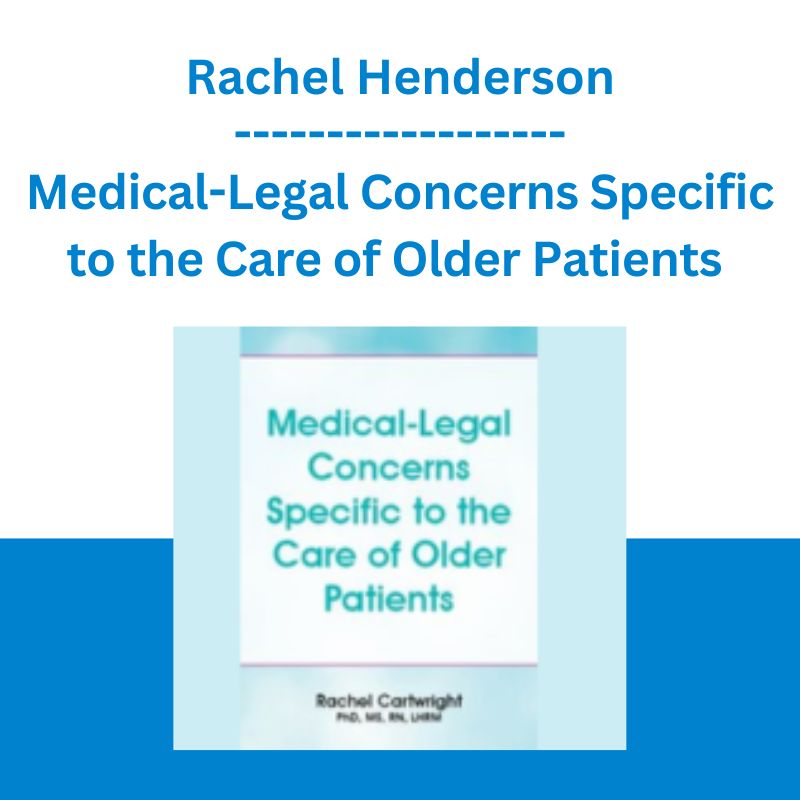*** Proof of Product ***
Exploring the Essential Features of “Medical-Legal Concerns Specific to the Care of Older Patients – Rachel Henderson”
Elders desire a life with good health, dignity, and peaceful death. Understanding their needs and concerns will ensure their best health possible. Knowing the legal rights of the elderly and the duties of healthcare providers will reduce liability exposure. Rachel Cartwright-Vanzant Ph.D., MS, LHRM, CCRN-K, will improve your confidence in acting when mandatory reporting is required and provide you with authoritative updates to guide your practice decisions.
Speaker
Rachel Henderson, PhD, MS, RN, HCRM, is an expert speaker on topics focused on legal aspects of healthcare, nursing documentation, and regulatory compliance. Her 22 years as a legal nurse consultant, inpatient clinical nurse specialist and healthcare risk manager (HCRM) bring life to her presentations by sharing real case scenarios. She is a member of the National Speakers Association (NSA) and past president of the Florida Speakers Association (FSA). She is a published author in peer-reviewed journals and textbooks. In addition to owning a medical and legal consulting business, she has her PhD in Public Policy and Administration: Law and Policy. Rachel works with law firms and healthcare organizations, evaluating medical records for compliance with standards of care and applicable regulations. She has been an expert witness for medical negligence cases for both the plaintiff and the defense.
Speaker Disclosures:
Financial: Dr. Rachel Henderson has employment relationships with Medical Legal Concepts, Florida SouthWestern State College, and Palm Beach State College. She receives royalties as a published author. Dr. Henderson receives a speaking honorarium and recording royalties from PESI, Inc. She has no relevant financial relationships with ineligible organizations.
Non-financial: Dr. Rachel Henderson is a member of the American Association of Critical Care Nurses, the American Society of Healthcare Risk Managers, and the American Society of Professionals in Patient Safety.
Objectives
- Apply the CMS rules to advance care planning.
- Choose the appropriate type of advance directive for a clinical scenario.
- Determine the best resource for interpreting a DNR order.
- Analyze elder abuse from a criminal and civil perspective.
Outline
Advance Care Planning
- CMS definition, billing
- Patient qualifications for ACP
Advance Directives Considerations
- Title 42 – Public Health Code of Federal Regulations
- State regulations – NHPCO access
- Living wills
- Instruction directives
- Health care proxy
- Health care power of attorney
Do Not Resuscitate Orders
- Legal implications
- Ethical considerations
- State statutes
Elder Abuse and Neglect
- State statutes
- Civil and criminal
- Seven types of elder abuse
- The most common type of elder abuse
- Physical signs of abuse
Mandated Reporting Requirements
- Online resources – RAINN
- Compare state statutes
Target Audience
- Nurses
- Nurse Practitioners
- Clinical Nurse Specialists
- Physician Assistants
- Physicians
- Physical Therapists
- Physical Therapist Assistants
- Occupational Therapists
- Occupational Therapy Assistants
- Speech Language Pathologists
- Social Workers
- Nursing Home Administrators
Please see the full list of alternative group-buy courses available here: https://lunacourse.com/shop/









